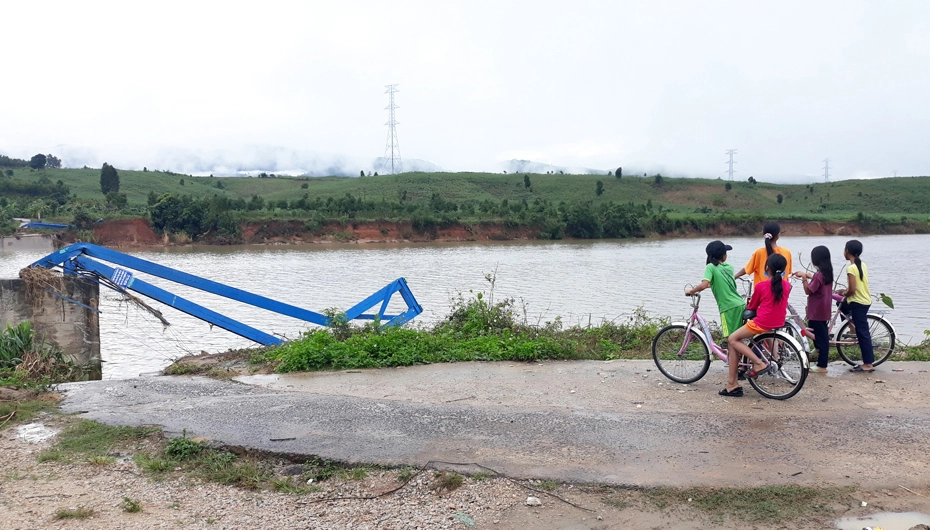Media Centre - Opinion Piece - 25 February 2021
Let’s show young people generational solidarity by acting on climate change

It was the images that flashed across our screens for those long, terrible weeks of the Australian bushfires last summer that became a tipping point for me. Pictures of kids in boats, wildlife destroyed en-masse and birds falling from the sky, of entire ecosystems made uninhabitable. Of course, I had been acutely aware of climate change up until then.
But last summer’s bushfires became a shocking vision of an apocalypse unfolding right now in real time, and jarringly brought it home to me that this was an issue demanding urgent attention including within our own organisation. It hit me that we are now face to face with a global emergency.
As chief executive of Plan International Australia, the charity for girls’ equality, I’ve been asked why our organisation would be campaigning on climate change. After all, climate change has traditionally been identified as an environmental issue.
Yet from our work we can see that climate change goes further than just the environment – it is already having a profound impact on the education, livelihoods, human rights and protection of children, and especially girls, in places around the world where Plan International works. It is clear today that climate change is an existential issue, and one of intergenerational justice.
Over the past years, we have become increasingly aware that children in some of our nearest neighbouring countries like Tuvalu, Kiribati and the Solomon Islands are already mourning their lost culture. They are among a number of countries who have been forced to begin planning their own arrangements for the upcoming displacement of their people due to rising sea levels.
As recently as December, my colleagues in Fiji had a level 5 cyclone to contend with that has displaced many on Fiji’s second island, prompting Fijian PM Frank Bainimarama to comment on Twitter on the day the cyclone hit: “On this same day in 2012, Fiji was enduring Cyclone Evan, Since then, we’ve been battered by 12 more cyclones – two of which (Winston and Yasa) and now jockeying for our hemisphere’s strongest-ever storm in history. This is not normal. This is a climate emergency.”
When I think of some of my colleagues and the girls we work with in these countries who are faced with this most fundamental of displacement on their near-term horizon, I ask myself – how do you even know who you are anymore if your country is gone forever and your friends and family displaced?
What has become clear to me is that tackling climate change has become a child rights and a girls’ rights issue – because if we love our children and genuinely want what is best for them in the long term – we need to act urgently now in their name.
As we can see from what has been dubbed the “Greta effect”, all around the world girls and young people are raising their voices and calling for meaningful action to address the climate crisis.
They are rising up and acting in order to secure their own future survival. But all too often they continue to be ignored or scorned by decision makers. This has to change.
As an international charity with offices in more than 75 countries globally, we have become acutely aware of how the impacts of climate change can magnify the inequalities girls already disproportionately face in different regions of the world, including compounding lack of access to education, poor access to sexual reproductive health services, vulnerability to violence and human trafficking.
This occurs because when countries lose basic infrastructure due to extreme weather events (as we have recently seen in the Philippines, Vietnam and Fiji) or are forced to relocate entire populations due to rising sea levels (as is occurring in Pacific islands including Tuvalu and Kiribati), girls in particular become more vulnerable both to exploitation, and are often forced to leave school to look after their families.
Domestically, we need our government to act on this intergenerational responsibility to protect children and girls from worsening climate impacts by urgently reducing our emissions targets in line with keeping global temperature rise to below 1.5C and demonstrating strong leadership on climate action while transitioning to a zero-emissions global economy.
In doing so, we can help to build the capacity of vulnerable communities, both in Australia and overseas, to deal with the ravages of climate change we are already experiencing.
If we look back on 2020, young people who had to sacrifice so many of the things they love owing to COVID in order to stand in solidarity with the threats to their grandparents’ health. They missed school, were denied rites of passage rituals and ceremonies, skipped work and were unable to spend time with their friends.
Now it is our turn to act with generational solidarity in our hearts when it comes to climate change, we owe our young people we love nothing less.
Susanne Legena is chief executive of Plan International Australia.
*This article first published in the Canberra Times
Media contacts

